Dog
6 Reasons Why a Mother Dog Does Not Produce Enough Milk: Natural Milk Replacers & Feeding Recommendations
Puppy milk is essential for growth. Unfortunately, not every mother dog can produce enough milk for their babies, and this can cause problems. In this article, we will discuss the reasons why a mother dog does not lactate enough milk and we will also examine what alternatives exist for nursing mothers who are unable to provide adequate nutrition. We will also talk about how best to feed the puppies as well as other tips that will help you boost your pup’s growth rate!
Why Isn’t My Mother Dog Lactating?
There are several reasons why a mother dog does not lactate enough milk for their babies.
1. Medical reasons
Prolactin is the hormone that triggers milk production. If a medical condition such as hypothyroidism or mastitis is preventing it from being produced, then the mother will not lactate enough for her puppies. This is common for dogs that go under c-section.
2. Hormonal changes
Pregnancy can also cause hormonal imbalances that lead to insufficient milk production in dogs and this poses a problem for nursing mothers who do not have access to alternative milk. Weight loss during pregnancy may also impact hormone levels and affect your dog’s ability to produce adequate breastfeeding milk.
3. Malnutrition and Dehydration
Malnutrition can also lead to insufficient milk production, and this is a common problem for pet parents who are struggling with feeding their mother dog. Dehydration can also be the cause of insufficient milk production in dogs. Wrinkly teats are a visible symptom of dehydration and this can be a sign that your nursing mother is not producing enough milk for her puppies.
A nursing doggy needs a lot of energy in form of calories to keep up with her milk production. To meet this, you will need to increase the frequency of feeding rather than giving bigger portions at each mealtime. You can feed rich protein source food such as egg or liver to increase mother dogs calorie intake
4. Environmental reasons
Lactation is also triggered by environmental factors. If a mother dog doesn’t have the proper conditions to be comfortable and well-fed, then she will not lactate enough milk for her puppies. This includes things like discomfort from being in too much heat or cold, lack of access to food, etc.
5. Mental/emotional reasons
Maternal instincts are what help trigger the hormone prolactin into production which helps with milk production as well as nurturing behaviours such as nursing pups back to health when they are sick. It’s possible that stress can cause an emotional response that prevents these maternal instincts from activating properly so it becomes difficult for dogs to produce sufficient amounts of milk. These could include anything from changes in the household to a new pet in the home.
6. Intestinal worms or tick infestation
A heavy parasite burden can also lead to insufficient milk production. It’s important to keep your pet healthy by deworming her regularly, and this will help ensure that she has enough milk for her puppies without having any problems with parasites.
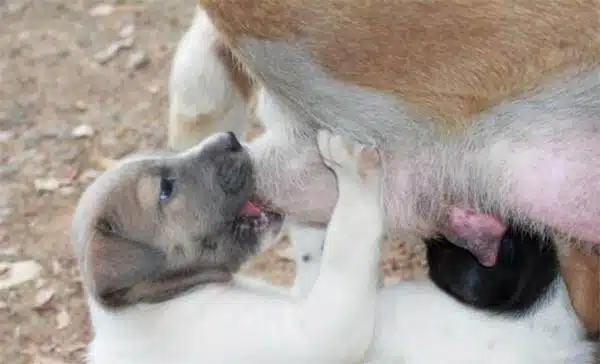
What Can I Do About It?
Many dogs will lactate during the birth process, but usually, they’ll produce milk only when their puppies nurse on them. The production of oxytocin (a maternal hormone) should make milk available to her pups by the time she is whelping. However, if a mother dog does not lactate enough milk when she’s nursing her puppies, then it is important to find an alternative replacement.
Call your Veterinarian: Always consult your veterinarian first! They will be able to tell if there is an infection that you have not been able to identify. The veterinarian will also advise you on suitable milk replacers and how to give them.
Puppy Milk Replacers:
There are several puppy milk replacements that you can use when nursing mothers don’t have enough milk on their own. These milk replacers are specially designed to replicate the natural composition of a puppy’s mother. They contain all six essential nutrients that puppies need such as protein, fat and calcium. There is also an important balance between fiber and protein in these products which helps with digestion.
The milk replacer should be about the same temperature as your skin or slightly warmer. The best results are when it is 35-37.8°C. Older the pup gets you can feed at room temperature.
PetsOwn Puppy Milk
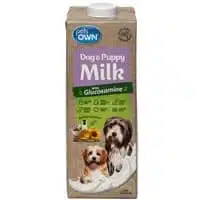
Made from fresh cows milk. The unique feature of PetsOwn puppy milk is that it’s Lactose-free. This is important for dogs who are allergic to lactose and will also help with the digestion process. The milk features all six essential nutrients with just the right balance between protein and fiber with an easy-to-digest formula that will grow along with your pup as they get older. It can be fed at room temperature or heated up until warm before feeding to your pups according to their preference!
K9-Puppy Gold Formula
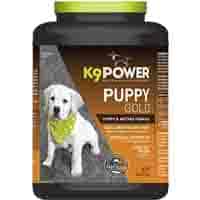
Puppy Gold is a natural supplement for puppies and mothers alike. This powerful blend of essential nutrients targets skeletal formation, muscular development, bioactive proteins, lactotransferrin (a primary immunity booster found in mom’s milk), and more. Made with an exclusive triple-antibiotic free formula to provide the absolute best nutrition possible throughout one’s life stages. Recommended for use while transitioning from nursing puppy to solid food or through pregnancy and after weaning as well.
Goat Milk-based Option
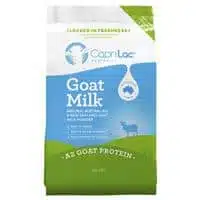
Goat milk can also be good for those pups with allergies or intolerances to lactose (milk sugar). Goat’s milk is less like dog’s milk than cow’s milk is, so nutritionally it’s not usually ideal. However, some dogs simply digest it better
Esbilac Puppy Milk Replacement Powder
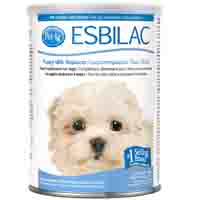
A great option for those who are looking to avoid cow milk. The Esbilac puppy milk replacement powder is a high-quality product that has all the nutrients needed for healthy growth in addition to balanced, digestible proteins and fats as well as natural antioxidants such as vitamin E, selenium, and taurine.
Homemade Alternative
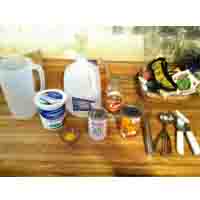
There’s nothing wrong with making your puppy milk replacer at home! This can be done by mixing fresh goats’ milk (or PetsOwn Puppy Milk), mixed with sterile water using about half of each ratio, add an egg yolk (not the whole egg!) then warming it up slightly.
How Do I Feed My Puppy?
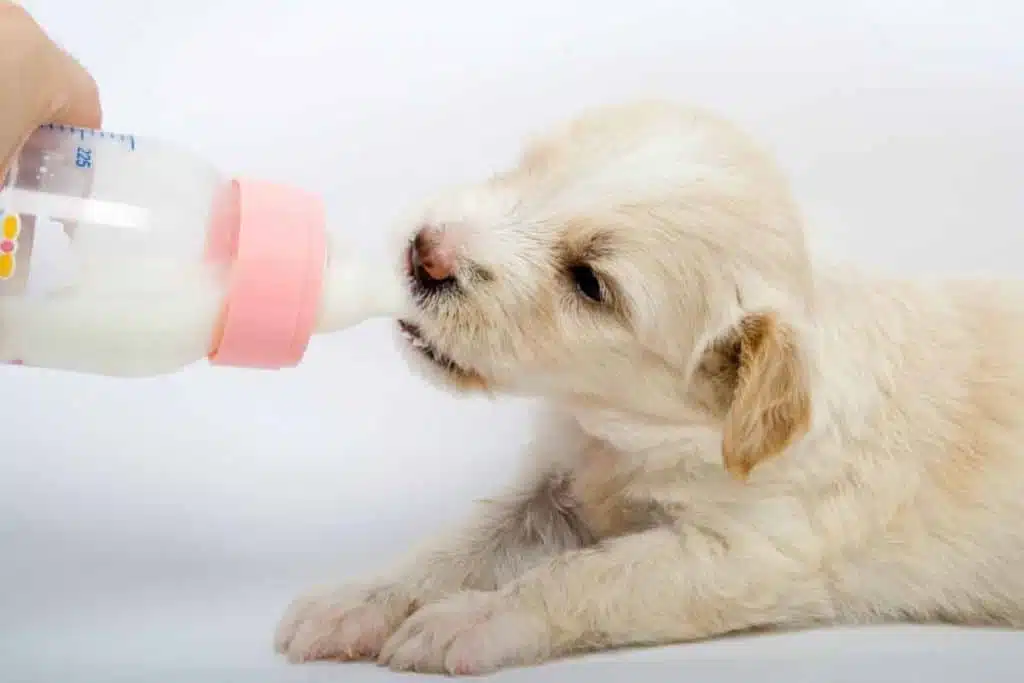
Once you’ve chosen your milk replacer, it’s important to know how best to feed it. Feeding your pup is not just about filling their stomachs. You must be mindful of the quantity and frequency of the feed.
It’s important to consider the number of puppies and their size, age and breed when calculating how frequently they should be fed. Puppies can usually eat up to six times a day, but this will depend on what milk replacer you are using.
Most puppies have a suckling reflex which means they will nurse on small pet nursing bottles. They can demand until full and then reject the bottle. The flow rate of the nipple should be precise. i.e one drop at a time! Anything excess will harm the pup or less must work hard to nurse. If the pup is too weak to suckle on its own, your vet can show you alternative methods and assist in tube-feeding if needed.
Hold the head in a neutral position as it would be when it’s feeding on the mother. This will allow for a natural latch and prevent choking.
Taking care of vulnerable puppies is a full-time task for any pet parent. Puppies grow fast and at three weeks old, they will start taking soft food. Most of your hard work is now over!
We’ve covered a lot of information in this post about the reasons why mother dogs do not produce enough milk for their puppies. In such a situation, your first resource should be your local veterinarian. Always seek medical advice first before trying out commercially available products. Please let us know your thoughts and suggestions. we would love to hear your experience and suggestions.













First time Mother dog had 11 puppies. 8 survived and she is a wonderful mother but with time she struggles to have enough milk. When can the puppies be fed soft food and how is it done with 8 puppies?